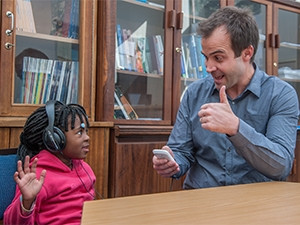
The University of Pretoria has developed low-cost technology that helps in diagnosing hearing disability.
The technology, called hearScreen, is a patented smartphone application that provides a mobile health solution for early detection of hearing loss and links patients to required health services. The software can turn any smartphone into an audiometer to test people's hearing.
Professor De Wet Swanepoel, who co-developed the hearScreen technology with Dr Herman Myburgh, says hearScreen provides a new way to overcome traditional barriers to the detection of disabling hearing loss by using low-cost, commercially available hardware (a smartphone and headphone) together with a custom-developed software application.
According to Swanepoel, there are more than three million people in SA with permanent disabling hearing loss, the majority of whom are unable to readily access hearing healthcare - starting with detection of the problem.
He points out the integrated school health policy (2012) by national departments of health, basic education, and social development requires 3.5 million children to have their hearing screened in SA on an annual basis.
The prohibitive costs of audiometric equipment and specialised training for screeners mean less than 5% of these children are being screened, he states. HearScreen was developed as a low-cost solution to make screening affordable and accessible, allowing generalists to conduct screening with very little training required, Swanepoel adds.
Hearing difficulty is a major cause of school failure in children and is linked to depression and even dementia in adults, he says.
"HearScreen provides the first smartphone-based hearing test that allows acoustic calibration of test stimuli according to prescribed national and international standards," says Swanepoel.
"It incorporates novel functionalities unavailable in current devices, with integration of real-time environmental monitoring during testing to ensure compliant noise levels, onsite data capturing and sharing capabilities through cellular networks that allow for centralised surveillance and monitoring from a hearScreen cloud-based service."
He adds that a referral database for hearing healthcare providers is linked to patients detected with hearing problems through location-based providers linked by text message or e-mail. "It is uniquely suited to be used at grassroots level to conduct population-based screening."
HearScreen is in a soft launch phase and the team has screened more than 5 000 adults and children to date and published three clinical validation papers in top international journals showcasing the accuracy and reliability of the solution.
"We plan to launch early in 2016 in partnership with the Vodacom mHealth division," says Swanepoel.
The solution was selected as one of 30 global impact start-ups to join the Impact Accelerator programme in Helsinki, Finland, organised by Slush and the Finnish Ministry for Foreign Affairs, with World Bank and 15 hubs or accelerators from emerging markets as partners.
Share